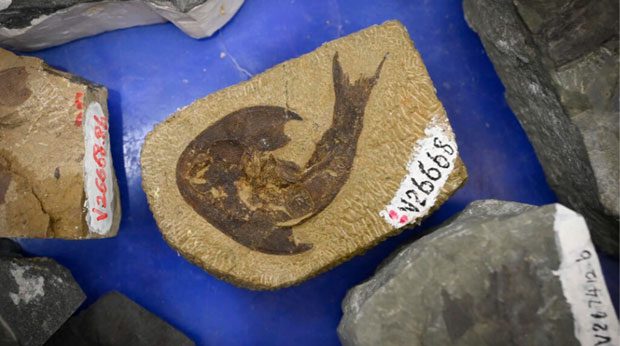The fossil sample found in Chongqing includes spiny fish fossils with a hard, spiny covering around their fins. This species is considered an ancestor of jawed vertebrates, including humans.
On September 28, researchers announced the discovery of fossils of fish dating back approximately 440 million years, found in China. They believe these specimens provide valuable insights into the evolutionary process of humankind.

This is the fossil of the oldest jawed fish. (Source: france24.com)
The ancient fish fossils were discovered in Guizhou (Southern China) and Chongqing (Southwestern China) since 2019. According to researchers from the Institute of Vertebrate Paleontology and Paleoanthropology (IVPP) under the Chinese Academy of Sciences, these fossils provide crucial information indicating that the human body structure may have evolutionary origins from ancient fish species hundreds of millions of years ago, thus adding important knowledge that has yet to be understood about the evolutionary process from fish to humans.
New findings were published in the scientific journal Nature on September 29, with analyses providing the clearest evidence of the evolutionary process. Specifically, the fossil sample found in Chongqing includes spiny fish fossils with a hard, spiny covering around their fins. This species is considered an ancestor of jawed vertebrates, including humans.
In 2013, scientists also reported the discovery of fish fossils dating back 419 million years in China, which overturned previous hypotheses that modern bony animals evolved from a shark-like creature with a cartilaginous skeleton. The newly discovered organism, named Fanjingshania, existed about 15 million years before the known fish.
According to Zhu Min, the lead author of the study, this is the oldest jawed fish ever subjected to anatomical study. The new data also provides essential information about the evolutionary steps leading to the formation of adaptive traits in vertebrates, such as chewing jaws, sensory systems, and paired limbs.
The fossils found in Chongqing are also the only specimens dating back 440 million years that still retain a complete skeleton from head to tail, offering valuable information about what is considered the dawn of fish evolution.
John Long from Flinders University, Australia, regards these findings as fascinating, providing groundbreaking knowledge that could potentially rewrite much of what we understand about the early history of jawed vertebrates in the evolutionary process.





















































